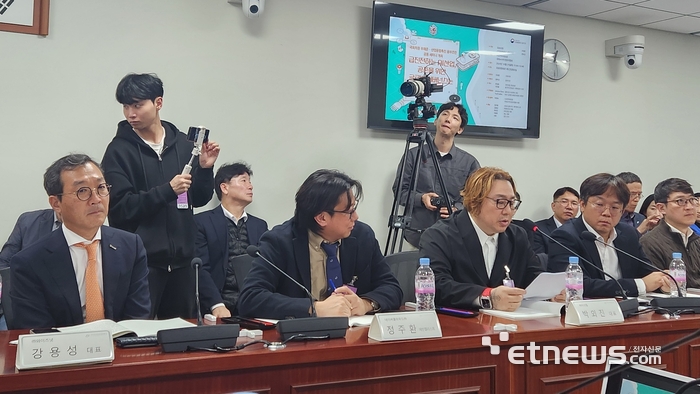
(From left) Wisenut CEO Kang Yong-seong, Naver Cloud evangelist Jeong Ju-hwan, ACRYL CEO Jin Park, Vuno CEO Lee Ye-ha, and Finda Chief Technology Officer (CTO) Seo Hee participated in a designated discussion at the Industrial Convergence Promotion Ombudsman Seminar held at the National Assembly Hall on the 31st. It is being announced.
Domestic artificial intelligence (AI) industry experts agreed that governance suitable for the industrial field should be established for the development of national AI.
On the 31st, a seminar co-hosted by Rep. Woo Jae-joon of the People Power Party and Han Moo-kyung, the Industrial Convergence Promotion Ombudsman, was held at the National Assembly Members’ Hall.
Under the theme of ‘Is global governance for coexistence in the rapidly advancing AI industry possible?’, the seminar was attended by Jin Park, CEO of ACRYL, Kang Yong-seong, CEO of Wisenut, Jung Joo-hwan, evangelist of Naver Cloud, Lee Ye-ha, CEO of Viewno, and Seo Hee, CTO of Pinda, who participated in the designated discussion.
While agreeing to the establishment of governance to prevent side effects from the development of the AI industry, they emphasized that the perspectives of the industrial field should not be excluded.
Jin Park, CEO, said, “We need to think about whether governance or technological perfection and maturity is important for our country’s AI industry,” and pointed out, “If we look at various indicators evaluating AI competitiveness by country, our country’s ‘government policy index’ is higher than that of the United States, but our ‘technology score’ is far lower than that of the United States.”
He continued, “If we look closely at the enforcement of the European Union’s (EU) AI Act and the failure of the US state of California’s AI regulation law, they are all focused on not losing their country’s AI technology leadership,” and said, “When establishing our country’s AI governance, an industrial perspective must be taken into consideration.”
Kang Yong-seong, CEO, emphasized that the industry’s perspective should be taken into consideration, saying, “AI governance mainly discusses vague concepts such as artificial general intelligence (AGI), but from an industrial perspective, AI is still in the pre-game stage.”
He added, “Although discussions on AI governance are necessary, AI has not yet expanded to all industries,” and “The budget for applied research and R&D for the development of commercialized AI solutions and services should be expanded.”
Evangelist Jung Joo-hwan also argued, “The reality is that AI use is still low in individuals and industries,” and “The government should increase AI literacy education for the private and public sectors and activate cloud use so that small and medium-sized companies can also be competitive in the AI industry.”
There were also opinions that AI governance should have expertise and specificity in each field, such as healthcare and finance.
Representative Lee Ye-ha said, “I understand that the AI Basic Act proposed to the National Assembly will serve as a foundation for fostering and developing the AI industry,” and “Rather than unconditionally defining AI in specific fields, such as healthcare, as high-risk AI, consideration should be given to detailed areas within the field.”
CTO Seo Hee said, “AI governance should also consider small and medium-sized businesses and startups that have difficulty meeting high-cost regulations,” and “In areas with many regulatory areas, we should lead technological development through a sandbox system.”